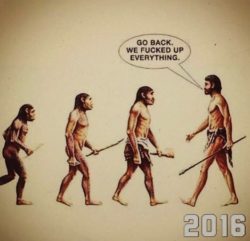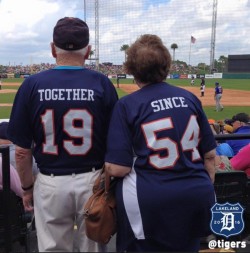Blog Archives
This ad for Hillary is making the rounds:
Video of @realDonaldTrump flinching and #Hillary keeping cool when their podium is rushed now has 600,000 FB views. pic.twitter.com/GwQViMOV8i
— Peter Daou (@peterdaou) August 6, 2016
 I agree with the central criticism of the ad, that Trump is (likely) panic-prone in a way that Cold Fish Hillary Clinton isn’t. The ad itself seems like a bit of a cheap shot, though. Donald Trump’s reaction is likely the far more normal of the two. When it’s a first time, being alarmed is a reasonable reaction. There are exceptions of course, such as would-be Senator Stillson to the right. But for the most part, I would be spooked, wouldn’t you?
I agree with the central criticism of the ad, that Trump is (likely) panic-prone in a way that Cold Fish Hillary Clinton isn’t. The ad itself seems like a bit of a cheap shot, though. Donald Trump’s reaction is likely the far more normal of the two. When it’s a first time, being alarmed is a reasonable reaction. There are exceptions of course, such as would-be Senator Stillson to the right. But for the most part, I would be spooked, wouldn’t you?
Its also the case that Hillary Clinton has been dealing with the Secret Service for approaching a decade. Her poise is impressive, but its not her first rodeo. She knows that most of the time when they surround you, its nothing. Trump has no real way of knowing that.
The other thing is that it can encouraging baiting, which is good for precisely nobody. What I mean by that is that while Trump is prone to fly off his handle, there are things that his opponents have done to try and often succeed) to bait him into it. And when its something like the size of his hands and other parts) or whatever, well okay. But what you really don’t want is a situation where some nut gets it into his mind that maybe via a threat he throw Trump off, tilt the election, and Make a Difference.
That… would not be a good thing.
So to Team Hillary and Trump critics, I’d suggest they find another example.
 Hanley charts out Gary Johnson’s path to the presidency! Well, to a likely loss in the US House of Representatives, but close enough.
Hanley charts out Gary Johnson’s path to the presidency! Well, to a likely loss in the US House of Representatives, but close enough.
Hillary Clinton is going all out on immigration. Good chance this will never backfire…
Ryan Briggs talks about gentrification, and how rather than being a tool of integration may just be a shifting of segregated racial boundaries.
I am a fan of revenue-caps on traffic courts, though I can see why you wouldn’t want to to place the caps differently in different places. Also, please don’t do this.
As France comes to grips with the terrorism spike, some Muslims are showing solidarity by attending Catholic Mass and refusing to bury the perpetrator.
 After School Satan. If I lived in Deseret, this would have an appeal! I do wish they would separate the trolly aspect from the more positive ones, though.
After School Satan. If I lived in Deseret, this would have an appeal! I do wish they would separate the trolly aspect from the more positive ones, though.
Lyman Stone’s piece on migrations and oil booms is worth a read.
Stop trying to get me to like Tim Kaine, it isn’t going to work.
It turns out, Republicans also go and watch movies.
 Sexless millennials, there are more than one might think! Well, at least young people being unable to move out of their parents’ house is having some benefit.
Sexless millennials, there are more than one might think! Well, at least young people being unable to move out of their parents’ house is having some benefit.
When football and immigration law collide.
CapX looks at attempts to disrupt poverty by moving people around.
Akshat Rathi cheated sleep for a year.
Noah Feldman argues that law schools should not try to limit admittance to people that will be able to pass the bar.
 Porky dumped me because I didn’t properly understand one of her poems. At least, that’s what she said. I thought I understood it well enough. I was even complimentary. But I shared my thoughts, and she explained that I didn’t understand it at all and ended with “You know what? This isn’t working.”
Porky dumped me because I didn’t properly understand one of her poems. At least, that’s what she said. I thought I understood it well enough. I was even complimentary. But I shared my thoughts, and she explained that I didn’t understand it at all and ended with “You know what? This isn’t working.”
I once had a living situation that was blown up by my two roommates and an argument they got involving Mighty Ducks 3. Dennis wanted to watch the movie, Karl thought it was a dumb movie. They got into a fight, and never spoke to one another again.
When I was working at Falstaff, we (the managers and team leaders) could tell when someone was planning to leave, or at least actively looking for a way out. There would be a 20-30% drop in measured productivity, lunch breaks would take about ten minutes longer, and so on. You’d be surprised the stupid things that can compel one to look for a new job.
Once, Sally was considering leaving a boyfriend over a particular problem they were having. One of her holdups was the problem that of the top 25 ways in which she had wronged him, this was not even on that list. It was small. She was trying to justify leaving despite that.
My advice to Sally (biased though it may have been) was relatively simple: It’s rarely the biggest straw that breaks the camels back. It wasn’t really about this trifling thing anyway. This was the accumulation of all things. How she was feeling at that moment was really the realization, however come to, that things simply weren’t going to get better. He’d left town for a weekend without telling her or anyone his plans. But for a guy that had physically threatened her (with a knife in his hand, at one point), cheated on her more than once, threatened to hurt her friends, it was odd to her that a weekend getaway would be the last straw. But that’s just it, it was the last of many, many straws. Sally didn’t actually leave him. He left her. Well, I guess technically she left him, but only after he’d stopped calling her, and after he’d demanded (and received) a unilaterally open relationship. She’d basically rode with him to the bitter, bitter end.
The last year or so, she had been looking for the right and justified thing to leave over. The thing that was worse than all of the other things. She was measuring the straws for length and girth to determine that this was the most reasonable straw on which the back shall finally give way. If you’re doing that, it means two things. First, it means that your back is pretty strong. That you can take it, but are choosing whether to or not to. It also means that you’re likely already deeply in sunk cost territory.
But sometimes, the back just breaks. A small thing becomes a clarifying moment. A realization that all past things were truly indicative of all future things, and all future things are likely represented by all past things. Often, it’s realizing that the other person isn’t trying, that it may suit them to become even worse, and there is no reason for it to get better.
Porky had reasons for dumping me, but the poem wasn’t really the one.
I mention all of this in conjunction with the Election 2016 news of the day, which is that allegedly a number of Republicans have finally had enough. I’m seeing a lot of commentary talking about how the Republicans put up with so much odiousness from Donald Trump but the one thing they couldn’t abide was his refusal to endorse Paul Ryan and John McCain. This narrative ignores a lot of the underlying dynamics. I don’t know if this will be the straw that does break the elephants’ back or not. I do know that this isn’t the only straw, and we should be wary about judging the broken back by the last straw that fell upon it.
There is some natural bafflement over the length and girth of the straw here. I think Trump’s refusal to do so is actually kind of justifiable. It’s a primary and not a general election, and neither McCain nor Ryan endorsed Trump during his primary and Ryan made a point of doing so only reluctantly after he did win it. Further, just a couple of weeks ago he was talking about donating money to defeat John Kasich and Ted Cruz in the future, and he didn’t even specify in the primary. Everything he does going forward is going to be debatably less bad than something he’s done before. It would be folly for the GOP to wait until they finally have that one thing that is worse than everything else.
For formatting purposes, I’m not going to put this paragraph in bold but I almost want to so that I may underscore its importance, but none of this is a defense of the RNC or any particular individual. Dumping Trump now, if it happened (and I don’t think it will), or pulling endorsements if that happens (it might, but even there I wouldn’t bet on it), doesn’t rectify much. I’ll view any who bail now with less male malevolence than I view any who don’t, but that’s only comparative. I don’t want to valorize them. I want them honestly humiliated. They deserve to be. (That may be the only thing both Trumpers and I agree on, albeit for different reasons.)
Beyond that, though, it’s a matter of individual assessment. If Porky had never said word one about being unhappy in our relationship, then I would be able to attach great importance to The Poem. Had she always seemed unhappy and tentative (which she did), then I would assign less. With politicians and public personalities, we only know the public face they put on and will only find out later how disturbed they were or weren’t about the events leading up to this week. Newt Gingrich has loved it, and Rudy Giuliani has gotten into it, so I’m not sure they can credibly scale back. Paul Ryan, on the other hand, has demonstrated a discomfort throughout the process. My inclination has been to say that Reince Priebus, for example, had been somewhat indifferent until now, though maybe that’s an unfair characterization. Time will tell.
To be honest, I am myself at a bit of a loss as to why this could be the thing that tips it over. There’s not even a cynical interpretation. There is nothing clear to me now that wasn’t clear when he got the nomination to begin with. Except that now it’s too late to deny him the nomination, even if they were so inclined. I think that the Khan story really got to some people. I also do think that the endorsement thing matters for a lot of the wrong reasons, but also because it touches on the one thing they had been using all along to rationalize their support: party loyalty. I find these explanations lacking, but I’m in my own head and not theirs.
My guess is that they’re going to go the Sally route anyway. It would be one thing if it were a Corbyn situation where something will continue indefinitely without intervention. In this case, though, there is a stamped end-date, and what I can only assume is an incredible temptation to wait it out for lack of any better option. Trump happened in part due to a lack in leadership. There were a hundred earlier interventions that would have had an enormous impact. If you’re too squeamish to cut off your finger that has gangrene, you’re probably not going to cut off your arm.
The Southern Tech Packers have two message boards. One is free (Techsters) and one that costs a nominal fee (Packlands). The latter is better, in part simply because it costs money. That repels trolls and attracts a higher sort of fan. Also, since people around are members, there is more motivation to treat one another with a degree of consideration.
It also leads towards an informal, but socially enforced, ban on discussing politics. Because if you want to get along, talking politics on a sports board is a bad way of going about it.
Sometimes, this is difficult to avoid. For instance, Sotech is a state school and state budgets matter to the university and its athletics program. So we have to discuss the governor and his proposals without discussing whether we like the governor’s position on abortion and taxes. You can sort of tell who leans in what direction, but it’s sort of up to people not to say “This is why nobody should have voted for our spithead governor to begin with!!!” when we hear of potential budget cuts, or “Our governor is so great, and such a great Christian!” when they do something good for the school.
For the record, most of the folks on both Techsters and Packlands lean to the right. The former more in a Donald Trump way, the latter in more of a Mitt Romney way, which is kind of what you would expect.
In any event, there has recently been a flap at the school involving its Student Union Treasurer. You can google it if you know what school I went to, or you may have heard of it, but I do ask for discretion about mentioning it here. The long and short of it is that the SUT made a comment somewhat derogatory towards #BlackLivesMatter in favor of #AllLivesMatter. This lead to sanctions from the Student Union, which of course opened up a Free Speech discussion.
There is a threat about it on Packlands, but everyone is contorting themselves not to talk about BLM, police shootings, racism, or… anything other than free speech. There is a consensus that there should be no sanctions for saying #AllLivesMatter. Though some people are itching to argue further about why this is, and whether it’s because #AllLivesMatter is correct or because it’s a free speech issue. Also, #BlueLivesMatter has also come up. All the while, everyone *trying* to observe the community norms.
It’s actually kind of interesting to watch.
The minimum wage in Seattle has gone up, but the sky has not fallen:
Pay for low-wage workers climbed more in real Seattle than in synthetic Seattle, while their employment rate and hours climbed slightly less.
“Seattle’s experience shows that the city’s low-wage workers did relatively well after the minimum wage increased, but largely because of the strong regional economy,” it says. “Although the minimum wage clearly increased wages for this group, offsetting effects on low-wage worker hours and employment muted the impact on labor earnings.”
Real Seattle had more businesses open after the law passed, while synthetic Seattle had fewer businesses close.
“We do not find compelling evidence that the minimum wage has caused significant increases in business failure rates,” the report says.
Boom!
The results are actually something of a rorschach test, though. The author starts off with the angle that, basically, employment in Seattle is growing like gangbusters and we don’t know whether or not the minimum wage is to thank for that. Which tells you a lot about where he’s coming from on the issue. The Washington Post takes a more sober view:
Things seem to be going pretty well since Seattle bumped the hourly minimum wage for large businesses up to $11 last year, from the statewide minimum of $9.47 an hour. Low-wage workers are getting more time on the job and making more money. Fewer businesses are closing, and more new ones are opening. The technology and construction sectors are booming. Even the weather cooperated for a change. The spring was unusually dry in Seattle, which was good for the city’s fishing fleet.
Yet the actual benefits to workers might have been minimal, according to a group of economists whom the city commissioned to study the minimum wage and who presented their initial findings last week.
The average hourly wage for workers affected by the increase jumped from $9.96 to $11.14, but wages likely would have increased some anyway due to Seattle’s overall economy. Meanwhile, although workers were earning more, fewer of them had a job than would have without an increase. Those who did work had fewer hours than they would have without the wage hike.
Accounting for these factors, the average increase in total earnings due to the minimum wage was small, the researchers concluded. Using their preferred method, they calculated that workers’ earnings increased by $5.54 a week on average because of the minimum wage. Using other methods, the researchers found that the minimum wage hike actually caused total weekly earnings to drop — by as much as $5.22 a week.
Minimum wage critic Adam Ozimek also throws his two cents:
The detailed approach taken by the study and the importance of unrelated economic trends highlight the care and precision that must be taken in studying the impact of minimum wages. For example, government administrative data were used, which allowed the same workers to be tracked over time, and ZIP codes were aggregated to create a comparison group.
The research also highlights the difficulty in simply looking at Seattle before and after the minimum wage hike to determine the effects. Seattle’s economy was growing strong before the hike, and as a result, the economists estimated that only 25% of the earnings gains that low-wage workers experienced by late 2015 can be attributed to the minimum wage hike, while the rest is due to a strong economy. Simply showing that Seattle added jobs after the minimum wage hike does not disprove job losses.
Another important takeaway is that this is not yet a test of what a big minimum wage hike does to a city. By the end of this study, Seattle had lifted the minimum wage from $9.47 to $11, which increased low-wage workers’ pay by 7.3% on average. Seattle is still far from the $15 minimum wage it will reach in January 2017.
Finally, the study shows the importance of tracking workers over time. By following low-wage workers who were employed in Seattle to begin with, the economists found that some adjusted to the hike by finding work outside the city. This suggests that even if total employment in an area is not affected by a minimum wage hike, low-skilled workers might be worse off as they are displaced by high-skilled workers and pushed out of the city.

Photo by Hikosaemon 
Having said that, I actually find the results here somewhat alarming. If I am thinking of an ideal situation for a city to be able to absorb the impact of a raised minimum wage, Seattle going from just shy of $10/hr to $11/hr is a pretty good one. That there is a measurable effect there makes me wonder what’s going to happen when their minimum wage continues to climb. And what’s going to happen in California, where lower wages are both easier to justify and a competitive advantage in Bakersfield for precisely the aforementioned Spokane jobs.
It’s uncharted territory, and I’m glad I’m not the guinea pig.
 Franklin Harris has a theory on why comics and Hollywood are angling for superhero and action hero diversity.
Franklin Harris has a theory on why comics and Hollywood are angling for superhero and action hero diversity.
The restoration of Gladiator school!
And the eyes of a parched California turn towards Israel…
The Keystone XL Pipeline may have been killed, but the Dakota Access Pipeline never became a symbolic cause. Not that it isn’t without its objectors, however.
I’m inclined to agree with Robert Pondiscio, here. I support as many alternative models to college as we can make work, and people should be cost-conscious, but that means being aware of the costs (tangible and intangible) of not going the traditional route.
Because people, I assume.
 It’s hard to build affordable housing because it’s not affordable. I definitely believe it to be the case that city mice are much more worried about inequality because there are a lot more zero-sum commodities. Like real estate.
It’s hard to build affordable housing because it’s not affordable. I definitely believe it to be the case that city mice are much more worried about inequality because there are a lot more zero-sum commodities. Like real estate.
Wait now, who hated the VCR? (Other than the MPAA, of course.)
Kids today! When I was young, it was no television that was the punishment.
We may have to come up with a new fable. Many worker bees, apparently, are kind of lazy. This has to be a product of mound tax and benefit policy, right?
Richard Marshall interviewed Costica Bradatan about murdering philosophers.
State lines – or in this case provincial ones – can lead to weird results (see also, Texarkana).
 Ever wonder what abandoned Soviet space shuttles look like? Here ya go.
Ever wonder what abandoned Soviet space shuttles look like? Here ya go.
Jonathan Last illustrates the excuses that the Trumpists will have lined up after November, if things don’t go well. I think things are going to settle on #8.
Donald Trump has released an attack ad. Against Bernie Sanders.
The Juggalos are marching on Washington, DC.
 Since it became clear that he was (likely) the nominee, I’ve been wondering if Trump skip debates. He excelled in the primary debates in part because he was on the stage with a large number of people, and he had the ability to dominate the stage. That’s harder to do when there are only two people on the stage. I also thought Hillary Clinton might not try too hard, either, because standing next to Trump is like President Kramer dancing with the panda.
Since it became clear that he was (likely) the nominee, I’ve been wondering if Trump skip debates. He excelled in the primary debates in part because he was on the stage with a large number of people, and he had the ability to dominate the stage. That’s harder to do when there are only two people on the stage. I also thought Hillary Clinton might not try too hard, either, because standing next to Trump is like President Kramer dancing with the panda.
Trump has evidently started laying down the groundwork for a future rejection of debates.
Republican presidential nominee Donald Trump said he is unhappy that some of the debates planned between him and Democratic nominee Hillary Clinton are scheduled against NFL games.
He also said that the NFL wrote him a letter complaining about the scheduling of debates at the same time as football games — a point that the league disputes.
Trump told ABC News’ George Stephanopoulos: “I got a letter from the NFL saying, ‘This is ridiculous. Why are the debates against –,’ because the NFL doesn’t want to go against the debates.”
An NFL spokesman said in a statement, however, “We did not write a letter, but we obviously prefer the debates on a different night than scheduled games.”
A Trump campaign source told ABC News that “Mr. Trump was made aware of the conflicting dates by a source close to the league. It’s unfortunate that millions of voters will be disenfranchised by these chosen dates.”
As it turns out, the NFL sent him no such message*. Also, the debates were scheduled last year before it became apparent that Trump would be the nominee. So this is not a case of the debate commission working to screw Trump. That said, not all of his complaints are illegitimate. One of the rejoinders to Trump’s charge is “The NFL hadn’t even released its schedule yet!” With an implied “BOOM!” afterwards, as though this proves Trump is full of it.
I mean, I guess that’s a response, if we assume that it was completely unforeseen that there would be NFL football games on Sunday and Monday nights in October. This wasn’t a case of the NFL dropping a random Tuesday night game. Nor is it a case of “Well, they have to put it on weekend nights because people don’t watch during the week.” The weeknight debates in the primaries were always the highest rated. And weeknight debates aren’t some unusual Trumpian request. That’s what they did in 2012. And 2008. And 2004. I’m not going to go back to 1976 or anything, but having debates coinciding with football is new. The only weekend debates were on Friday nights.
This is not unlike some people defending the DNC against accusations that it was rigged against Sanders. The Democratic debates also took place at hilariously inopportune times. “But,” people said, “nobody knew that Bernie Sanders would be her rival.” That’s just it, the DNC didn’t put its thumb on the primary against Bernie Sanders. They did it for Hillary Clinton. Likewise, during the general election debates, I doubt they were arguing for anything because of Trump, but rather for Hillary.
Why the RNC agreed to it, I’m not sure. It seems to me that with or without Trump, the people more likely to be watching are not going to be evenly distributed politically and it’s probably in the GOP’s best interest that football fans watch. And if the goal was civic engagement, it’s a fail.
* – As far as we know. On the other hand, Trump and the NFL may be tight after he destroyed the USFL for them.
Bruce Schneier is worried that Russia is going to hijack our election:
This is indeed disturbing. Not just because of what Russia could do, but because of what a number of interested parties could if they were so inclined. Foreign threats are particularly worrisome, though, because they’re beyond our jurisdiction.Even more important, we need to secure our election systems before autumn. If Putin’s government has already used a cyberattack to attempt to help Trump win, there’s no reason to believe he won’t do it again — especially now that Trump is inviting the “help.”
Over the years, more and more states have moved to electronic voting machines and have flirted with Internet voting. These systems are insecure and vulnerable to attack.
But while computer security experts like me have sounded the alarm for many years, states have largely ignored the threat, and the machine manufacturers have thrown up enough obfuscating babble that election officials are largely mollified.
We no longer have time for that. We must ignore the machine manufacturers’ spurious claims of security, create tiger teams to test the machines’ and systems’ resistance to attack, drastically increase their cyber-defenses and take them offline if we can’t guarantee their security online.
What I find interesting is how many people on Twitter have suggested that this is further proof we need to take elections out of state hands and put them in the trust of the federal government. This strikes me as backwards.
Whether elections should be run by the states or the federal government is an interesting question, and one I am on the fence about. My love of federalism blah blah blah says it should be done by the states, and until the last few years that was my position. However, the logjam on some election reforms I would like to see, as well as elections themselves becoming something of a partisan fight, have shifted me towards the middle. But this? This pushes me back towards the states. Indeed, it makes me a little more fond of the electoral college.
The idea of doing everything federally is that The Federal Government Can Do It Right. The thing is, though, that even if we grant the competence of the federal government as being more substantial than that of the state governments, it also creates a central port for hacking. All Putin or anyone else would need to do is get into one system. Meanwhile, under a state-run situation, they’d need to get into five or six at minimum. Even if it’s twice as difficult to get into the federal system, the odds are better with the state systems. This, to me, suggests that there should be more separation rather than less.
Further, fraud would be easier to detect if they could get through some but not all of the state systems. If they can get into Pennsylvania but not Ohio, the odd results would be more noticeable. If they can get into a central system, they can manipulate the results in such a way to make it difficult to tell, giving the appearance of a uniform swing.
Schneier’s specific proposals seem okay to me. I am mostly against technology in voting. The long count in Australia has given me second thoughts, but it’s more difficult to manipulate pencil and paper, and you can (if you are so inclined) add controls. You can mitigate this with paper tracking, though, and I’m certainly open to that.
But please, let’s not get into this notion that if we just centralize everything and leave it open to the experts in the federal government, only then will we be safe.


